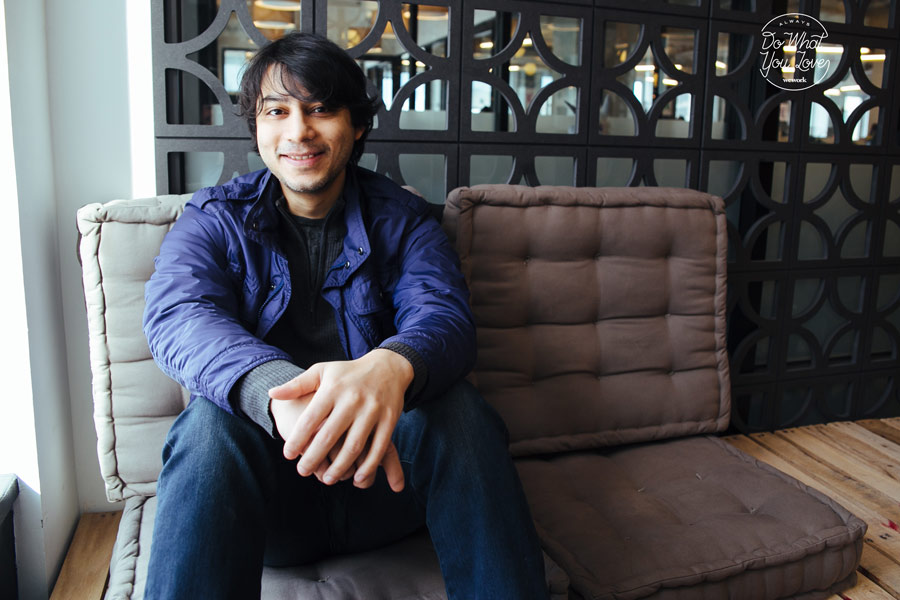Anshul Mathur, co-founder of Torchbug, is a physician turned entrepreneur. We sat down with him for this edition of Do What You Love – a series that showcases the individuals behind startups and small businesses.
Here’s what he shared:
I grew up in a multicultural area in India so we had a lot of influences from the United States, Russia, and of course, Britain. When I moved to New York City, I fell in love with the melting pot culture. That’s what really fires me up on a daily basis.
In India, I thought this path was common: You go to school, pick a track, give up on everything you like, and then you get a job. I went to medical school when I was 17, and I received my medical degree at the age of 21, which is kind of nuts.
When I moved to the U.S. to pursue a master’s in Public Health, I realized that the American education system was so different. People were cross registering for classes, and I remember asking my advisor if I could take a poetry course and he gave me the go ahead. I would never be able to do that with the education system back at home. This really opened up my world.
The best advice I ever received came from a Frenchman. I used to work at McKinsey & Company in management consulting for about two years. One night I was having a casual conversation with a partner from France. He asked me what I wanted to do with my life, and I told him that I wanted to be an entrepreneur. “Why don’t you?” he asked, but I laid out this whole plan for him with items that I wanted to accomplish with the exact skills I would need and a list of people I would need to meet.
He just looked at me and said in his French accent: “[Nonsense]. You already have the business skills from working here for two years, but you’re making excuses because you’re too scared to pull the trigger.” That really woke me up. A week after that chat, I talked to one of my managers and they gave me a sabbatical for almost a year to come to New York and find myself. I ended up leaving the company and went out on my own.
TorchBug is like Pandora for books, film and television shows. We provide taste analytics and make recommendations. It used to be a consumer product, but it’s become more of a B2B data product.
My first startup idea was a self-publishing company. I started a little Facebook app in 2009 when I was in grad school. It was called My Empty Slate, an application for people to upload poetry and short stories and share them with their friends. It got about 10,000 users pretty quickly, but when I looked at it, I realized that most of the content was rubbish. Everyone and their mothers were publishing stories or poems they wrote in the third grade, but there were a few gems.
Being an entrepreneur is an evolving process. Honestly, when I first started, I had no idea what I was doing. I believed that my product was going to be the next Facebook, and I was going to get one million users. I used to be so enamored about the idea of potential success and that was stressing me out. In the last two years, it has been more about doing what I love. I realized quickly that success may or may not come, and I’m okay with that. It’s about seeing the joys in the every day things and building a great product.
Once I started building the product myself, I started to see things differently. About a year ago, I didn’t know how to code so I hired a team to build out my ideas. I realized that I was pushing my team of programmers to do stuff that I didn’t even understand. It’s like buying a factory and telling people what you want by killing them to death with work. Even when the product looked good, I never felt an affinity to it (or with it). My programmers were miserable, and I wasn’t sleeping. After a certain point, I decided to learn coding and start from scratch.
I found my co-founder about seven to eight months ago when I was in a completely different mindset. I used to have aggressive conversations with people at meetups, but I realized that being humble about your product helps. I met him through someone at a networking event who introduced me to him. We had two meeting and then he became our CTO.
Our company’s special because of our workweek. We come into the office on Tuesday through Saturday. When everyone’s really fired up or stressed out on Mondays, we’re relaxed and walking around New York City. One of the ground rules I’ve set for the both of us is to not take things so seriously, and so far, it’s been a great system.






